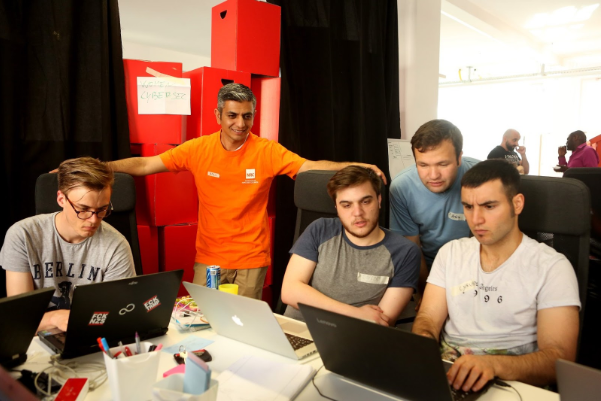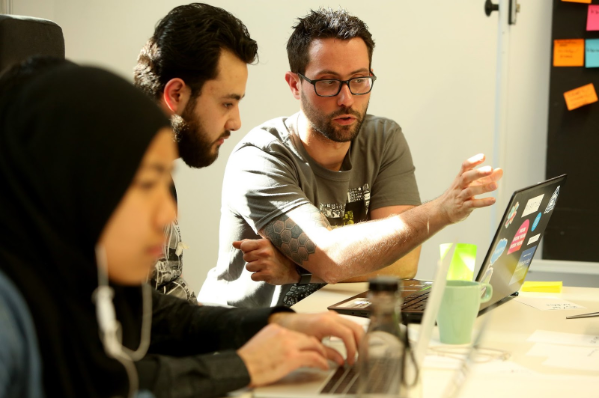The weekend of 20-22nd April saw Techfugees supporting ReDI school as they hosted a humanitarian hackathon for the Norwegian Refugee Council (NRC).
Working with ReDI and the NRC, we helped define the challenges and mentor participants during the hack. Tom, part of our core team, was among the mentors and judges.
Most of our hackathons are based on challenges set by NGOs. This is because we want our teams working on real problems being faced on the ground by refugees and the NGO workers who support them.
In this case, the NRC set most of the challenges, each focused on a specific area or set of areas where refugees and displaced persons face problems.

Image: Adam Berry for ReDI School
Our hackathon challenges
South America, Iraq and Ukraine challenged entrants to provide accurate, up to date legal information, at scale, to Venezuelan refugees, displaced Iraqi citizens, and Ukrainians in non-government controlled areas.
Although these challenges deal with very different locations, they were sufficiently similar in structure to be compressed into a single challenge, as the technology could be replicated with location-specific content.
In Iran, thousands of Afghan refugees are living and working in the Iranian desert. Iran has a water shortage, which is being exacerbated by climate change. The refugees are dependent on water purification units, which sometimes break down.
The challenge was to design a system that could pull information on water quality and system status into an app, and transmit the information to engineers who can come to fix the units quickly when needed.

Image: Adam Berry for ReDI School
In Jordan, rental agreements are often made verbally, leaving both landlords and tenants in a vulnerable position, with refugee tenants particularly vulnerable. The challenge was to capture rental agreements electronically, so they can be referred to later on, in the event of a dispute.
Gaza’s challenge was also water-related. Gazans suffer from a lack of clean drinking water, and are heavily dependent on the private sector, which is largely unregulated, resulting in variable water quality.
The challenge was to create a rating system that would help Gazans make better choices about their suppliers, and to incentivise suppliers to provide better quality water.
There was also an independent team who brought their own project to the hackathon: to track aid money using blockchain.
Here Technologies also provided tech support for teams who wanted to use their mapping API, as well as a prize for its best implementation.
The competition heats up
The hackathon kicked off on Friday night with presentations, before the hackers formed teams and set to work on their ideas. The projects were submitted to Devpost.
Saturday was divided up by milestones so the teams could manage their time effectively, uploading their prototypes by the 23:55 deadline. We felt that it was important to set this deadline so as to avoid the all too common hackathon situation where teams work through the night, exhaust themselves, and then produce less-than-adequate presentations.
On Sunday morning, Tom from Techfugees gave the teams a briefing on how to present, and everyone spent the next couple of hours perfecting their pitches, before they went up on stage.

Image: Adam Berry for ReDI School
Congratulations to our winners:
The Iran team scooped first place and an invitation to NRC in Oslo, as well as €1,000 for best solution and another €1,000 for best use of the HERE API.
Second place went to the South America/ Ukraine/ Iraq project, who won tickets for Startup Weekend Berlin.
All projects were offered mentoring by Techfugees, and we hope that they will all, in one form or another, be of use to the NRC.

Image: Adam Berry for ReDI School

One thought on “Recapping our Berlin Hackathon with ReDI School and the NRC”